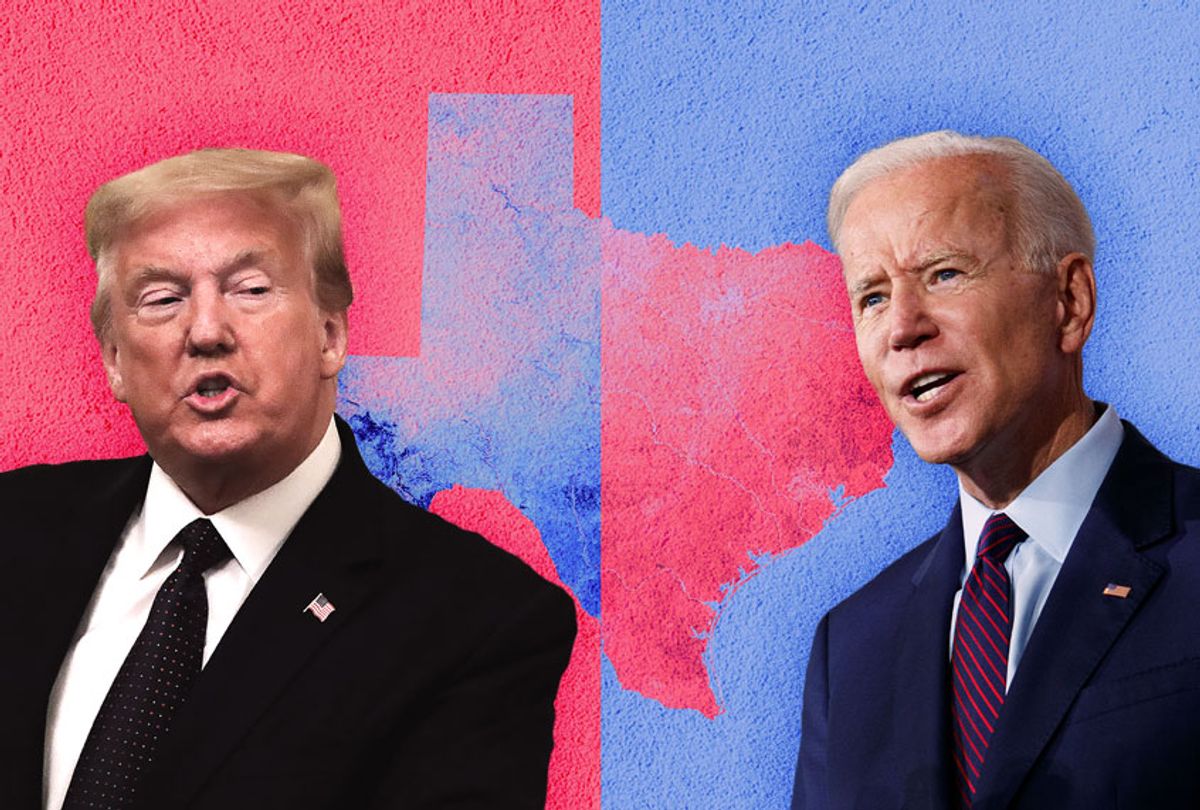The Electoral College on Monday affirmed former Vice President Joe Biden's victory in the 2020 presidential election, but not before Texas' 38 electors delivered their votes for Donald Trump and defiantly urged the legislatures of the swing states of Pennsylvania, Georgia, Michigan and Wisconsin to overrule the will of their voters and appoint their own electors.
The call from the Texas electors came in the form of a resolution they passed 34-4, but it had no impact on the results. The four states had already cast their votes by that time, and soon after California cast its 55 votes for Biden and pushed him over the 270 number he needed to win the presidency. But the resolution continued the practice of many Texas Republicans of baselessly questioning Biden's victory and claiming fraud.
The resolution also "condemn[ed] the lack of action by the U.S. Supreme Court" to overturn the election results. There was a brief debate among electors over whether they should keep language in the resolution denouncing members of the U.S. Supreme Court for "moral cowardice." On Friday, the high court briskly rejected a lawsuit filed by Attorney General Ken Paxton that sought to overturn the election results and had become a vehicle for Republicans across the country to contest Biden's victory.
One elector said the inclusion of the Supreme Court language would make Texas appear "childish, impertinent and angry." An amendment deleting the language eventually prevailed.
Biden won 306 pledged electoral votes in the November election, but Trump — along with many Texas Republicans — has refused to accept defeat and waged a legal and political campaign to get certain swing states to undo the results. Typically, the meeting of the Electoral College is a mostly ignored formality. But Republicans' continued disputes of the election have caused this year's vote to take on a rare public fascination in 2020.
The resolution drew a mocking reaction from the Democratic lieutenant governor of Pennsylvania, John Fetterman.
We'll get right on that
— John Fetterman (@JohnFetterman) December 14, 2020
"We'll get right on that," he wrote on Twitter, followed by a post mocking the Dallas Cowboys.
Numerous lawsuits filed by the Trump legal team claiming or raising questions of fraud were thrown out of state and federal court. Even so, Paxton launched a last-ditch legal effort to overturn the election results last week, only to be soundly rejected by the U.S. Supreme Court. In the suit, he claimed that pandemic-era changes to election procedures in those states violated federal law and asked the high court to block the states from voting in the Electoral College.
Many leading Texas Republicans were supportive of Paxton's effort. More than a dozen Texans in Congress signed an amicus brief endorsing Paxton's tactic. Ted Cruz, the state's junior U.S. senator, agreed at the president's request to argue the case before the high court if it were heard. The state's senior senator, John Cornyn, questioned Paxton's legal theory, however.
When asked at the U.S. Capitol on Monday whether Biden is the president-elect, Cornyn responded in the affirmative. "I would say that subject to any other litigation that could occur between now and Jan. 20, the answer is yes," he said, according to Politico.
Meanwhile, state Republican Party chairman, Allen West, made national news after the Supreme Court's decision by suggesting that states opposed to the ruling "should bond together and form a Union ... that will abide by the constitution."
The next — and final step before inauguration — will be on Jan. 6, when the states send their votes to the U.S. Capitol, where they will be tallied in a joint session of the newly sworn in U.S. Senate and House. The Texas electors' resolution Monday urged lawmakers from the four swing states to object to their electors if they are not replaced by their legislators.
In most circumstances, electors follow the will of the state's voters. But in 2016, two Texas electors refused to vote for Trump — one voted for then-Gov. John Kasich of Ohio and another cast a ballot for a fellow Texan, former U.S. Rep. Ron Paul. Their dissent triggered Gov. Greg Abbott to push for a bill that would "bind" Texas' Electoral College members to the result of the statewide popular vote. The measure failed.
In Texas, Trump decisively defeated Biden, but the margin — 5.6% — was the closest between the two parties since 1996.
Electors are often low-profile party fixtures within the state's political world, but this year's Republican lot includes state Rep. Briscoe Cain of Deer Park. There are 538 electors total.
Hours ahead of Monday's meeting, even with Texas slated to deliver its votes to Trump, several Republicans suggested that the nation's election results were not yet settled.
"The Electoral College is casting their votes," tweeted U.S. Rep. Lance Gooden, R-Terrell. "Democrats will soon say it is time to move on. They are 100% WRONG. We should not move on until the massive claims of voter fraud are answered and addressed!"
U.S. Rep. Chip Roy, an Austin Republican, released a statement Monday afternoon saying "there's no question about the outcomes in Texas, despite the millions upon millions that Democrats desperately poured into races all over the place." But followed up with a call for for answers to "some legitimate questions" raised about "what went on in" races in other states.
The Texas Tribune is a member-supported, nonpartisan newsroom informing and engaging Texans on state politics and policy. Learn more at texastribune.org.



Shares